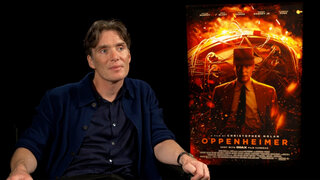Create a free profile to get unlimited access to exclusive show news, updates, and more!
What Did J. Robert Oppenheimer Do After He Made the Atomic Bomb?
For Oppenheimer, the bomb kind of blew up his life.
There is perhaps no scientific undertaking which has changed the world, and our place in it, more dramatically than the atomic bomb. The development of those weapons happened largely in secret, part of a clandestine project to bring an end to World War II. That story is getting the big screen treatment in Christopher Nolan’s Oppenheimer, now streaming exclusively on Peacock.
RELATED: The Science Behind Oppenheimer’s A-Bomb Explained
An atomic blast makes for a compelling narrative climax, but the real Oppenheimer lived for decades after the war ended, and the rest of his life was nearly as dramatic as his time at Los Alamos.
Oppenheimer’s Post-war Legacy
After the bombs were dropped on Hiroshima and Nagasaki, the existence of the Manhattan Project became public knowledge, and Oppenheimer became a household name. For a brief moment, he was heralded as a hero, the brilliant mind who cracked the atom and ushered humanity into a new age. But that wouldn’t last, and Oppenheimer would spend the rest of his life trying to navigate the shifting tides of scientific discovery and public opinion.
As the radioactive dust settled, Oppenheimer struggled to find steady post-bomb ground on which to stand. Following his departure from Los Alamos in 1945, he briefly returned to his post as professor at Caltech, but teaching had lost its luster. Two years later, he became director of the Institute for Advanced Study, an organization dedicated to the pursuit of knowledge for its own sake, located in Princeton, New Jersey.
The directorship was a pretty cushy gig for Oppenheimer. The institute favored unfettered scientific research, without stipulation or direction. It was practically a playground for a theoretical physicist at the top of their game. In addition, he received a salary of $20,000 per year, equivalent to roughly $280,000 today. He also got a free place to hang his hat in the director’s house, situated on 265 acres of woodland. Unfortunately, the good times wouldn’t last forever. In fact, they wouldn’t last long at all.
That same year, in 1947, the Atomic Energy Commission (AEC) was created to monitor and regulate the creation and use of nuclear materials. Oppenheimer served as chairman of the AEC’s General Advisory Committee (GAC), where he worked toward international guidelines and agreements to prevent or forestall a nuclear arms race. He also loudly opposed the creation of a hydrogen bomb, which would make the destruction at Hiroshima and Nagasaki look paltry in comparison.
By 1953, Oppenheimer had transitioned from lab-coated laboratory darling into a thorn in too many sides, largely because of his opposition to the hydrogen bomb. Ultimately, a letter made its way to then-President Eisenhower, accusing Oppenheimer of ties to the Communist Party in the Soviet Union. Oppenheimer requested a hearing which ended in his security clearance being stripped a day before it was set to lapse.
The truth of Oppenheimer’s connection with Communism is a little more complicated. He may have been a member of the Communist Party USA, and he certainly had associations with party members. However, there is no evidence that he ever passed information to the Soviet Union or worked on their behalf in any capacity, despite several attempts to recruit him. United States Secretary of Energy Jennifer Granholm posthumously vacated the decision to strip Oppenheimer of his clearance, in 2022.
A year after his clearance was pulled, in 1954, Oppenheimer began living for part of the year on a 2-acre plot in the U.S. Virgin Islands. While he maintained his opposition to the development of new and more powerful bombs, Oppenheimer largely excused himself from the public discussion.
Meanwhile other politically active scientists continued to lobby on his behalf, and, in a gesture of political rehabilitation, President John F. Kennedy awarded Oppenheimer the 1963 Enrico Fermi Award, an award granted by the President of the United States to scientists for lifetime achievement in the development, use, or production of energy. While Kennedy issued the award, President Lyndon Johnson presented it, after Kennedy’s assassination.
Two years later, in 1965, Oppenheimer was diagnosed with throat cancer, the result of a lifetime of smoking. He underwent surgery, chemotherapy, and radiation treatments but ultimately succumbed to the disease on February 18, 1967. He was 62.
How To Stream Oppenheimer?
For better or worse, Oppenheimer left an indelible mark on the world. See his story for yourself, Oppenheimer is now streaming exclusively on Peacock alongside a slew of behind-the-scenes featurettes.
The NBCUniversal platform currently offers two monthly subscription plans: Premium ($5.99 a month with ads) and Premium Plus ($11.99 a month with no ads and download access for certain titles). If you're a student, you can enjoy the Premium plan for just $1.99 for an entire year!
Looking for some theatrical action in the meantime? The Holdovers, My Big Fat Greek Wedding 3, The Exorcist: Believer, Fast X, Ruby Gillman, Teenage Kraken, Five Nights at Freddy's, and Strays are all streaming on Peacock!
Originally published Jul 21, 2023.



















